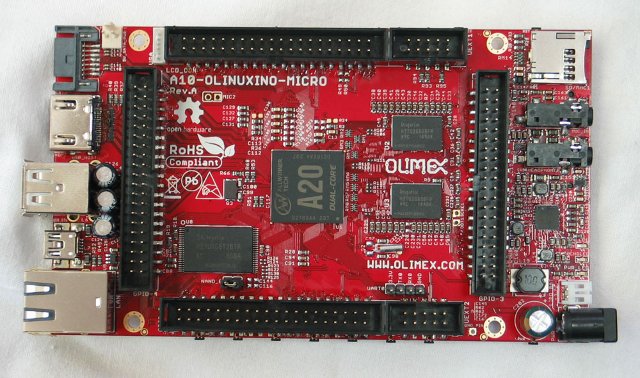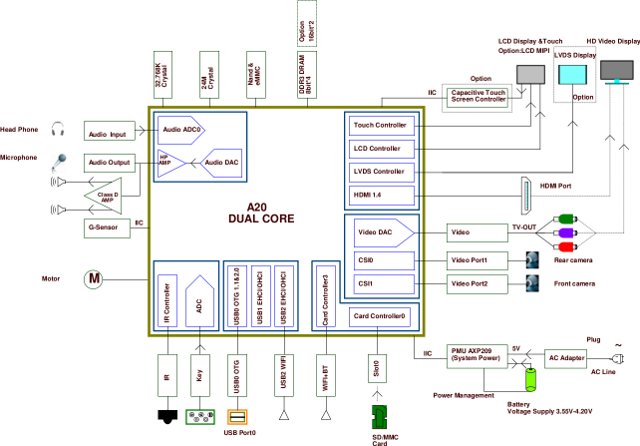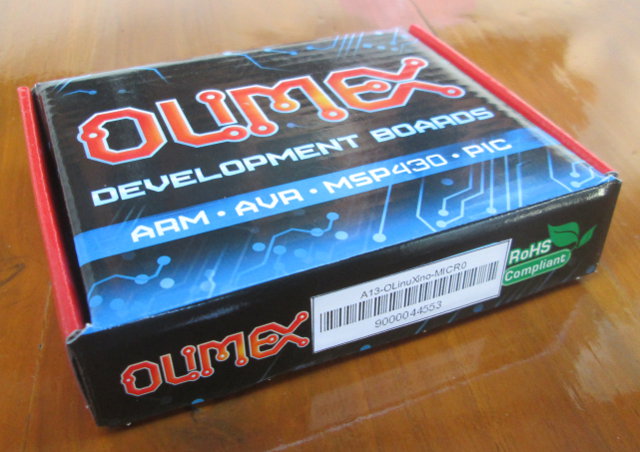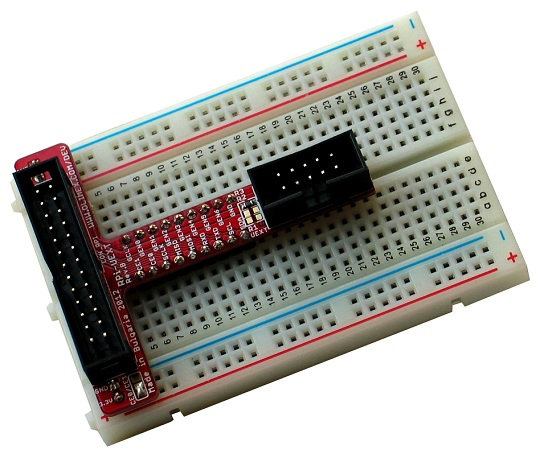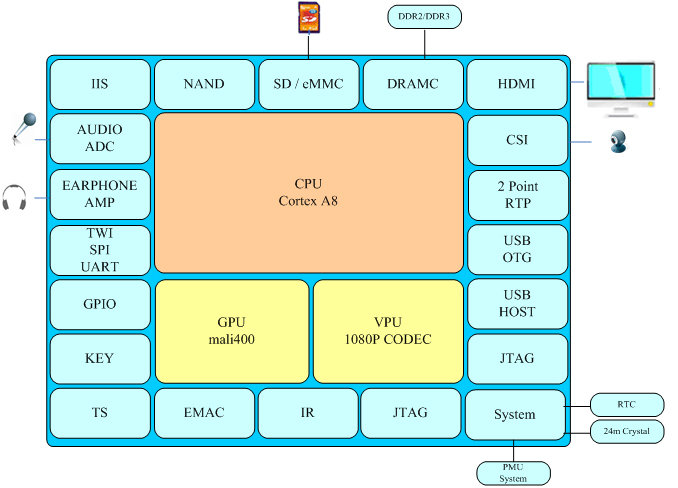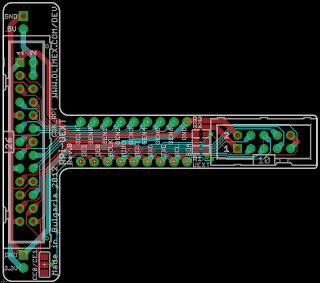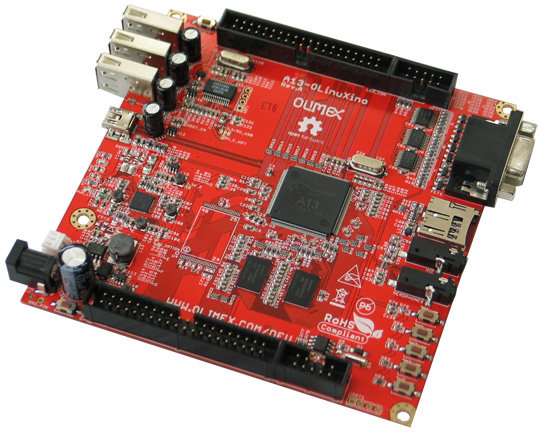Yesterday, Olimex showed their new A20-OLinuXino board. This AllWinner A20 board is still a prototype, and there are currently 3 of them only, but the good news is that it appears to be working, 50 developer edition boards will be manufactured shortly, and mass production should start in June. AllWinner A20 dual core Cortex A7 can clearly be seen in the middle of the board, but if you look close to the top left, you’ll see a marking: “A10-OLINUXINO-MICRO”. That’s because, as planned, they managed to design one PCB for both AllWinner A10 and A20 processors, and they’ll sell both versions. Olimex A10/A20-Olinuxino boards have the followings specifications: SoC – AllWinner A10 Cortex A8 processor or AllWinner A20 dual core Cortex A7 processor, both running @1Ghz System Memory – 512MB or 1GB DDR3 memory depending on model Storage – 4GB NAND Flash (optional), 2x microSD card slot, and SATA connector […]
AllWinner A20 Linux Source Code, EVB Schematics and Product Brief
Hardware based on AllWinner A20 such as Cloudsto Media PC PRO DRIVEDOCK, should start to be available soon, and resources for developers have been slowly released (or leaked) to the community. AllWinner A20 Source Code The source code for AllWinner A20 and A31 has been released to sunxi-linux a while back, and they have started to clean up the code before hardware becomes available. The code apparently hasn’t made it to sunxi-linux github account just yet, but Linux for A20 has been imported into github at https://github.com/amery/linux-allwinner/tree/import/lichee-3.3/a20-dev. AllWinner A20 is known as sun7i in the code. AllWinner A20 Evaluation Board Schematics and Product Brief Olimex received A20 EVB schematics and product brief from AllWinner earlier this week, and as usual, they promptly uploaded those documents to their github account. The 3-page product brief does not bring anything new, and the data sheet does not seem to be available right now. […]
Final Release of Fedora 18 for AllWinner A10 & A13 Powered Devices
A few months ago, Hans de Goede, currently working at Red Hat and a Fedora contributor, started to show up on linux-sunxi mailing list, and sent a lot of kernel patches for linux-sunxi kernel. Last week-end, he announced “Fedora 18 Final for Allwinner A10 and A13 based devices” on linux-sunxi community mailing list. To install it, first download the image:
|
1 |
wget http://scotland.proximity.on.ca/contrib-images/hansg/Fedora-18-a10-armhfp-r1.img.xz |
And write it to an SD card (all data will be wiped out):
|
1 |
xzcat Fedora-18-a10-armhfp-r1.img.xz > /dev/mmcblk0 |
You may have to replace “/dev/mmcblk0” by your own SD card device, e.g. “/dev/sdc”. AllWinner based devices can share the same kernel, but u-boot is board/products specific, so you’ll have to install u-boot for your board. First remove the SD card, re-insert it in order to automatically mount the FAT partition, and run:
|
1 |
sh <uboot-part-mount>/select-board.sh |
This will show the list of supported boards and products. Then run the command again for your device. For example:
|
1 |
sudo sh <uboot-part-mount>/select-board.sh mk802 |
[…]
Olimex A13-OLinuXino-MICRO Development Board Unboxing And Review
Every Friday, Olimex organizes an online competition where they give away one of their board. They’ll ask a (usually simple) technical question on their twitter account at 22h00 (GMT+7), and all you have to do is to reply to their tweet with the correct answer within one hour. The winner is then selected randomly with random.org. There are usually 50 to 100 respondents so the odds are pretty good. I played a few times, and finally, I was lucky enough to win an A13-OLinuXino-MICRO development board at the beginning of December. I received it yesterday, after UPS took a whooping 15 days to deliver the board (Way to go UPS!). The board can be purchased on Olimex for 35 Euros plus shipping and taxes, or even lower if you order larger quantities. A13-OLinuXino-MICRO is a stripped down version of A13-OLinuXino-WIFI with the following specs: SoC – AllWinner A13 Cortex A8 […]
3.95 Euros RPI-UEXT Breadboard & UEXT Adapter for Raspberry Pi is Now Available
Last month, I wrote about an upcoming T-shaped adapter for the Raspberry Pi that can easily plug into a breadboard, and provides a UEXT connector that can bring new features (RTC, GPRS, sensors, relays…) to the Raspberry Pi via low cost external UEXT modules. Olimex has just announced the RPI-UEXT adapter is now available for 3.95 Euros. To connect RPI-UEXT adapter to the Raspberry Pi, you’ll need to purchase a 26-pin ribbon cable and a breadboard if you don’t have these already. Olimex provides those 2 for respectively 2 & 2.95 Euros. That means a complete set would cost 8.90 Euros. As discussed on my first RPI-UEXT post, what makes this little board really interesting are all the existing UEXT modules (over 20) that bring new features at very low cost. Olimex uploaded a video showing the Raspberry Pi, the RPI-UEXT and the MOD-IO UEXT module connected together, with the Raspberry […]
AllWinner A10s Processor Overview
Between the AllWinner A10 and AllWinner A13 processors, there’s now an alternative. AllWinner A10s is based on AllWinner A13 architecture (sun5i), but adds HDMI and Ethernet MAC which makes it suitable for mini PCs and set-top boxes. The first time I heard about this processor was in August with IP878 mini PC, and in October, one reader (Alex) informed me AllWinner had posted more details about his new processor. Here are the key features of this (relatively) new SoC: CPU/GPU – ARM Cortex-A8 Core with 32KB D-Cache/ 32KB I-Cache / 256KB L2 Cache, and Mali-400 VPU HD Video Decoding 1080p@30fps of VP8/6, H.264/H.263, WMV9/VC-1, WMV7/8, MPEG-4/2/1, Xvid codecs HD Video Encoding 1080p@30fps with H.264 codec Video Out – HDMI 1.4 (1080p), Memory Up to 1GB DDR2/DDR3 up to 533MHz (16/32 bits Data Bus) MLC/TLC/SLC/EF-NAND ECC 64-bit Peripherals: USB2.0 OTG, USB2.0 HOST (OHCI/EHCI) SD Card V.3.0, eMMC V.4.2 SPI, TWI and […]
Olimex to Provide $5 Raspberry Pi GPIO to Breadboard & UEXT Adapter
At $25 and $35 is Raspberry Pi is currently the cheapest board you can buy to develop for ARM Linux, however the expansion boards such as the Gertboard ($60) and the recent PiFace Digital ($32) are not as cheap considering the few components they have on board. This is why Olimex has designed a Raspberry Pi GPIO to breadboard & UEXT adapter (RPI-UEXT) which should be available in 2 weeks for 3.95 Euros (~$5). You then just need to add a breadboard for 2.95 Euros (~$3.8 ), which means for just $9 you can start prototyping easily with the Raspberry Pi. The RPI-UEXT adapter (PCB Layout pictures on the right) also features – as the name implies – a UEXT (Universal EXTension) connector which consists of 10 pins which provide power (+3.3V/GND), and access to asynchronous serial I/O, I2C & SPI signals. This connector allows to connect other UEXT modules […]
Olimex A13-OLinuXino-WIFI Developer Edition is Now Available
Olimex has announced that they started shipping A13-OLinuXino-WIFI-DEV, an AllWinner A13 development board with 512 MB, 4GB and a Realtek RTL8188CU Wi-Fi module that costs 55.00 Euros with free shipping by courier for a limited time. They announced the start of this project late April, so it took them just 3 months to bring this board to to market. The board has the following specs: SoC – AllWinner A13 Cortex A8 processor at 1GHz, 3D Mali400 GPU Memory – 512 MB RAM Storage – 4GB NAND flash + SD Card slot Power – 6-16VDC input power supply, noise immune design USB – 3 + 1 USB Host, 3 available for users and 1 for Wi-Fi module + 1 USB OTG port Wi-Fi – WIFI RTL8188CU 802.11n 150Mbit module on board Video output – VGA video output + LCD signals available on connector. Audio Output / Input RTC – PCF8536 on […]


